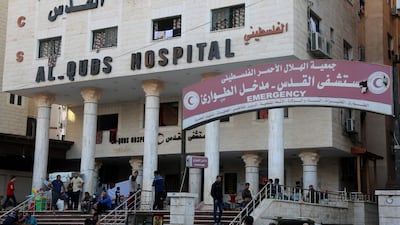Live updates: Follow the latest news on Israel-Gaza
After 10 days under siege, on Tuesday afternoon at 3pm the medical team at Gaza's Al Quds hospital made a daring move.
They decided to travel south to Khan Younis, partially on foot, with 25 patients, four in the intensive care unit, and a vehicle carrying much-needed equipment. They could not know how long the journey would take, nor how safe it would be.
The 200-strong convoy began to move away from Al Quds hospital, their home for the previous 10 days while it was under siege, and one of Gaza's key medical centres since the war with Israel began on October 7.
The goal was to leave the hospital, which went out of service days before, when fuel ran out under Israeli siege more than a week previously, meaning no electricity or means of communication besides what the team could sporadically muster through the VHF ambulance radio.
Some who left travelled in ambulances and vans, the rest walking.
“There was no way for new patients to enter. There was nothing the medical team could do for the patients stuck inside. It was effectively just a building, without electricity, food or water,” said Nibal Farsakh, spokeswoman for the Palestinian Red Crescent, which runs Al Quds hospital.
Using two ambulances rendered out of service after they became stuck at the hospital’s gates, the group made its way through rubble and devastation to the sound of shelling in the background as Israeli forces intensified their offensive on Gaza in recent weeks.
“They walked all the way until they reached an Israeli check point some 11 kilometres from the hospital,” Osama Al Kahlout, who heads the Red Crescent’s operations room in the south, told The National.
All 200 people were searched, he said, including patients.
“They were humiliated," he said. "They were told to sit on the floor and raise their hands. The equipment we were carrying was also searched meticulously.”
Then the rain came.
“The roads became muddy and difficult to travel on. One of the vehicles was stuck in the mud,” Ms Farsakh said.
The green light for the convoy to begin its move came “late”, Mr Al Kahlout said, so the team had to keep walking in the dark during air strikes, shelling and gunfire.
They finally arrived in Khan Younis at 10pm, he said.
There, the Red Crescent operates another hospital, Al Amal, meaning hope. But their situation is anything but hopeful.
More than 8,000 people are displaced there and in the adjacent Red Crescent building. People sleep anywhere they can.
“They sleep in stairwells. One person on each step. Pregnant women, women who just given birth. In the main hall, 200 families – 600 people – share one bathroom,” Mr Al Kahlout told The National.
The hospital and the centre have had no power for three days, since the main generator’s fuel ran out. They have been running on one small generator which is enough for the hospital’s labour room, and for the lights to remain on in the welcome centre.
That means rudimentary methods for keeping fresh blood cold are being used.
“The staff are using ice packs. And the children’s vaccines we have from the UN are likely to go bad in 24 hours because of the lack of refrigeration,” Mr Al Kahlout said.
The operations room, which usually has a direct line to Ramallah, has no internet connection.
“We just use mobile phones like we are right now,” Mr Al Kahlout told The National by phone. "And the signal is very weak. When I try to call them, I’m lucky if I get hold of them once every 10 tries."
The hospital’s surroundings are also dangerous, he said. Seven buildings have been destroyed in Israeli air strikes "with no warning". "Destroyed with the people inside,” he said.
At night, the number of people inside the hospital and the centre goes up, as people bring their families to stay.
“At any rate, nothing can describe the situation," he said. "No matter how much I try to.”


